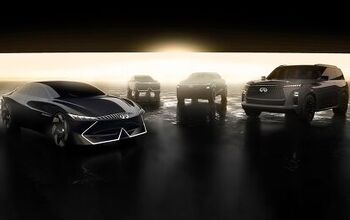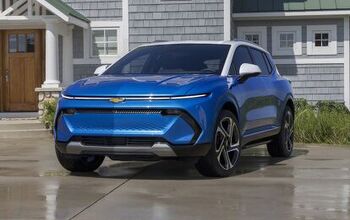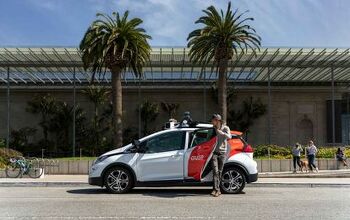TTAC News Round-up: Santa Fe Sports in Alabama, Tiguan With A Tether, And GMC Acadia Bows?

Is there a Santa Fe, Alabama? If not, there will be soon.
That, Volkswagen’s Tiguan + electron, who’s gonna buy all these electric cars, and you don’t really need a gas delivery service, people … after the break!
Santa Fe Sport to be assembled in Alabama, far from actual Santa Fe
Hyundai will build its Santa Fe Sport in Alabama this summer to meet expected increased demand for crossovers later this year, Reuters reported ( via Automotive News).
The Santa Fe Sport will continue to be assembled in Georgia as well.
Reuters reported that Hyundai would be spending $52 million to retool the Alabama facility to build the crossover. The Alabama plant currently builds the Elantra and Sonata, but will likely scale production of those two sedans to make room for the popular Santa Fe Sport this summer.
Volkswagen Tiguan Hybrid coming to Detroit …
Volkswagen will reveal a plug-in hybrid Tiguan at the North American International Auto Show, Reuters reported Friday.
The plug-in Tiguan will add to the automaker’s expected additions of a new mid-size crossover and long-wheelbase version of the Tiguan.
The automaker is scrambling to meet demand for crossovers and SUVs to help rebound from flagging sales due to its deepening diesel scandal, analysts told Reuters.
… and expect a new GMC Acadia, too.
General Motors will take the wraps off a new, smaller GMC Acadia, according to the Detroit News.
The three-row crossover likely will be built on GM’s Chi platform, which also underpins the new Cadillac XT5.
GMC chief Duncan Aldred told the Detroit News that the automaker had big plans in the near future “and our Detroit auto show also sets that direction,” but stopped short of confirming that the Acadia would be there.
The aging Acadia received its last full redesign in 2006.
Mobile gas delivery is really a terrible idea
The on-demand economy has some perks: I can get booze delivered to my home, stream bazillions of movies and get Amazon deliveries within the hour.
All of those conveniences are not bad, I must say. But Gizmodo highlights a recent phenomenon of delivery gas services that roam streets to fill up cars for app-wielding busy bodies who can’t make their way to the gas station.
Filld is a gas-delivery app that roams the streets of Silicon Valley with tanks of regular to fill up cars for a $5 delivery fee. Besides the safety questions surrounding people in parking lots filling up cars from roaming tanks, there’s the question of: Why?
If you’re that busy, Silicon Valley, find an intern to do it for you.
Electric cars: Who needs them?
Regulators in the U.S. are forcing automakers’ hands into building electric cars that no one is buying, Henry Payne wrote in an excellent column for the Detroit News.
Payne’s well-thought analysis foresees a future two-tier system for automakers with profitable trucks and SUVs subsidizing money-losing electric cars. Or, basically what’s going on now with California fleet requirements.
“The regulators are what are driving electric car production,” Kelley Blue Book’s Karl Brauer told the Detroit News. “It’s not because consumers are demanding them.”
Payne’s salient point is that automakers like Mazda, who have developed fuel saving technology such as SkyActiv, will receive no credit for their innovations and be forced into investing billions into battery tech that may not be as advanced.

More by Aaron Cole
Latest Car Reviews
Read moreLatest Product Reviews
Read moreRecent Comments
- ToolGuy TG likes price reductions.
- ToolGuy I could go for a Mustang with a Subaru powertrain. (Maybe some additional ground clearance.)
- ToolGuy Does Tim Healey care about TTAC? 😉
- ToolGuy I am slashing my food budget by 1%.
- ToolGuy TG grows skeptical about his government protecting him from bad decisions.




































Comments
Join the conversation
Henry Payne's 'excellent' column has some errors: 1. A 'compliance' car is not one built to meet national sales requirements, but one that is built for local requirements. The Fiat 500e and VW e-Golf are two examples typically labeled as compliance cars because they are not available nationwide. 2. No mention of Tesla, who sold more EVs in 2015 than anyone else. Because Mr Payne doesn't mention Tesla, he doesn't have to answer why this might be. Tesla's current high-dollar customers aren't as motivated by incentives as Leaf customers (for example), and research is showing that many EV buyers don't give a hoot about the so-called environmental benefits of an EV. They just like the EV driving experience, and the ownership experience is much simpler. My point is that the government isn't always forcing people to buy cars they don't want to. Here's where I agree with him: What Mr Payne doesn't really get to - but implies - is this: Consumers do not agree with Big Government's concerns about global warming. If they did, they wouldn't be buying trucks and SUVs like crazy. Ultimately, the government's CAFE requirements and the market will collide. EV subsidies will have to increase or be extended in order to keep people buying them (Tesla Model S aside). Fuel cell vehicles really expose the joke of government mandates - truly nobody wants them.
Will the Traverse and Enclave also migrate to the Chi platform?